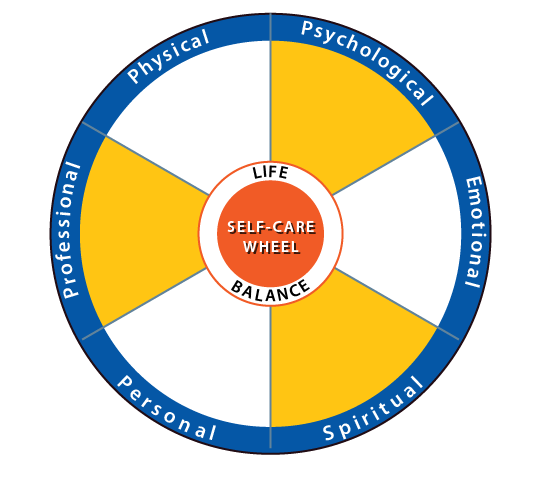Toolkit 4
Thriving
Making the Most of your Assignment
Toolkit 4 takes a look at your adjustment in the longer term, when the early transition phase is over. Your children are settled in school, your partner is busy with work, and your household is set up. Now comes the question of how you, the accompanying partner, will make the most of your time in your new location.
This toolkit recommends being intentional about your adjustment. Setting realistic, achievable goals will help you feel confident and motivated about being in your new home. This will help you thrive there and make the most of your assignment.
Soccer to the Rescue
At first, I didn’t want to move to the Dominican Republic. When I understood what a good opportunity it would be for my wife, I changed my mind and started to think of it as an adventure. I didn’t like my job that much anyway, and I thought a computer engineer can find work anywhere. It all turned out very differently.
I couldn’t get a job and it was difficult to get an internet connection. I was not allowed to open my own bank account. I became very frustrated and noticed that I was arguing more with my wife. I didn’t feel like myself at all and realized I needed to do something about it.
I got up my courage and joined a local soccer club, though I was unsure if they would accept me. I feel much better now that I play soccer once a week and have started getting to know the other guys. We have a drink after the game and I have to speak Spanish then, so I’m getting more confident using it.
Luckily, we managed to get the internet fixed up eventually and I’m doing an online course in marketing. Even if I can’t get a job here, these new skills will help me with my career in the long run. It has been really important for me to meet people and to get a regular program of things to do, to feel that I am getting a life of my own in this new place.
Making Orange Marmalade
Many hands chopping oranges and stirring marmalade over a wood-fire, with much laughter, and translations from French to English to Amharic and back again. These are vivid memories of my trip with some West African members of the UN Spouse Group of Addis Ababa. We had travelled up into the hills to share their recipes for using oranges with Ethiopian village women. When you join groups in new places to expand your social network, you never know what adventures it will lead to!
When we moved to Ethiopia it was our first relocation without children. There would be no chatting with other mothers at parent meetings or soccer matches. It was up to me to create my own social network. I also wanted to work, but the thought of yet another job search made me feel weary. Despite several previous relocations I was a bit apprehensive, but knew I had to make the effort to get out and make connections with people.
I followed up contacts in Addis given to us by WBG Ethiopian friends in our previous location. These wonderful new friends took me to local markets, helped me find my way around, and welcomed us into their homes for Easter and other celebrations. They opened our eyes to so much about their ancient culture that would have remained hidden otherwise.
I also taught English as a volunteer at an orphanage, took Amharic classes, and joined a book club. Eventually, through someone in my book club, I found work I enjoyed with an international NGO. Now I look back with joy and nostalgia at our years in Ethiopia as one of my favorite postings.
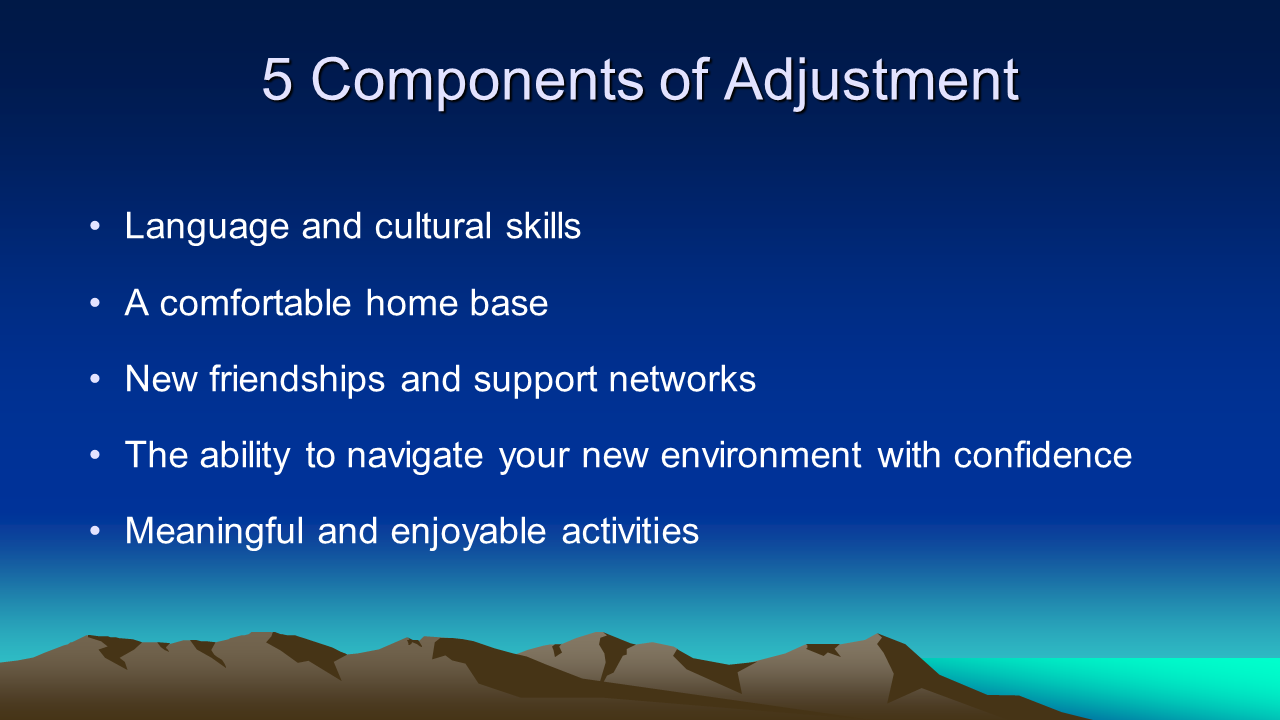
The above illustration shows the five key components of adjustment, which you will go through as you settle into your new home. When you arrive in a new location many important aspects of daily life are not yet in place. A satisfying lifestyle is unlikely to be served to you on a plate. You will need to be intentional to get comfortable with your life in a new place. It is necessary to plan ahead consciously, both during and after a move.
Goal setting is a way to take charge and shape your future. You can use this illustration as a guideline for your goal setting. This means setting specific goals related to each of the components of adjustment. There are many new things to get used to and it can be difficult to think clearly about goals when you first arrive, but do it sooner rather than later.
Conscious goal setting can help you pay attention to your environment and pick up on signals. For example, if you make losing weight your goal, you will soon start noticing gyms, weight loss products and exercise equipment. If you want to pursue another graduate degree, you will start noticing articles on universities and your chosen course.
Research by Harvard Business School professor, Teresa Amabile, shows that one of the most powerful indicators of mood and satisfaction is the feeling of making progress toward a meaningful goal. The feeling of achievement and moving forward brings about a dopamine hit in the brain, which helps us to feel positive and motivated. So, start by making small achievable goals to get you going.
Goals can be small and short-term, like a plan to unpack a box every day or to call a friend for a chat. Long-term goals would outline what you want to accomplish during the duration of stay in your new location. Most long-term goals can also benefit from being divided into smaller steps. Success depends on making your goals realistic. You may want to talk your ideas through with someone you trust to get another perspective.
Before you start, it is a good idea to name and express your feelings so that you are in a relatively calm state of mind. The journey of making the most of your assignment begins with recognizing and naming your losses, grieving them, and finding equally meaningful replacements. For example, if you loved cross-country skiing and are now located in tropical Thailand, you might decide to swim or scuba dive, not as a poor substitute but as a new activity you enjoy for itself.
Self-knowledge of what is necessary for you to thrive is critical to successful adjustment and making the most of an assignment. Taking the time for self-care is also important. According to Dr. Megha Gore, a WBG Mental Health Focal Point, self-care refers to the “actions that you can take to develop, protect, maintain and improve your own health and well-being.” She recommends developing a self-care plan as a preventive measure. This can include setting self-care goals. (See the Self-care Wheel, in Delving Deeper)
It is not selfish, then, to think about what you need to do to take care of yourself. This can be from small things, such as getting your hair done the way you like it, to being able to work. Self-care can mean ensuring that you make time each day to do something that matters to you, such as exercise, meditation, or reading a book. This can make the difference between surviving your assignment and thriving in it.
Our need for social connection cannot be underestimated. Though keeping in touch with loved ones virtually is important, it does not fully satisfy our need for human connection, as we have learned during Covid-19.
If you have relocated more than once, think about what you loved most about your favorite location. Most likely, it is related to the friendships you made. Building new friendships and a support system is one of the fundamentals to a successful assignment. Be intentional and proactive about this. Often, as newcomers we have to take the initiative, as discussed in Toolkit 2.
Children provide ready-made opportunities for building a new support network, through school and extra-curricular activities, so be open to the possibilities. If you move without children, building a new support network requires more effort, as the story of our member in Ethiopia shows.
Learning about the local culture and acquiring new language skills can help you feel more at home, and can increase the sense of social connection. When you can speak the language, at least a little, you understand so much more about your host country and its people.
Studying the language also can give you a sense of control in your new environment, because you will appreciate the cultural nuances better. For example, you might learn the correct greeting to be used depending on the situation. You will also be able to navigate your new environment better if you are able to ask questions, understand directions when you are lost, and interact with host country nationals.
The career of the accompanying partner can sometimes make the crucial difference between a family thriving in an assignment and finding it an uphill challenge. Many couples wrestle with the question of how to make dual careers and life work, as a couple or as a family. Statistics show that 60% of accompanying partners do not work during an assignment.
Perhaps you have given up a job that you loved and have lost professional recognition and financial independence. You may be trying to adjust to doing your job remotely and miss the camaraderie of the office, as many telecommuters have experienced during Covid-19. Or you might just be tired of the “stop and start syndrome”, which many accompanying spouses attest to.
The losses related to relocation have to be grieved and replaced, as discussed in Toolkit 2. The length of this grief process is individual and varies from person to person. Most of us are familiar with the five stages of grief: denial, anger, bargaining, depression, and acceptance. David Kessler, in his book, Finding Meaning: The Sixth Stage of Grief, argues that there is one more stage, which is finding meaning. It is this that can transform grief into a more peaceful and hopeful experience.
Expat partner work
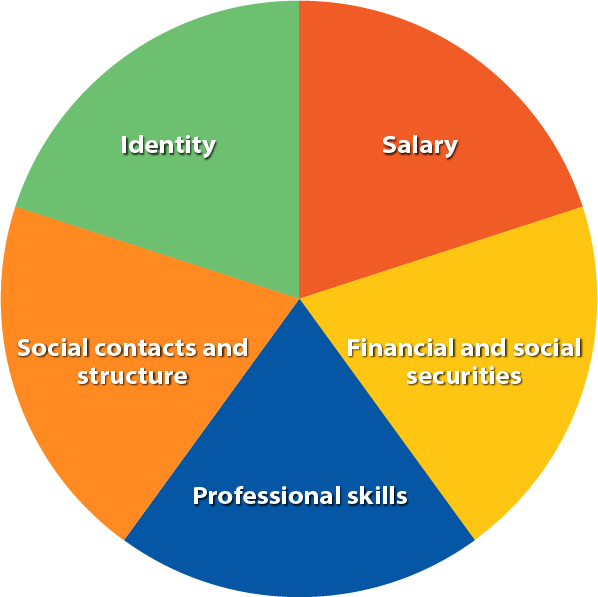
In your efforts to find meaning in your new life, it may be useful to understand and prioritize the different aspects of working. In their book, Expat Partner, Staying Active and Finding Work, Carine Bormans and Marie Geukens suggest using the image of a pie to help think through what is really important to you. They divide the pie into five equal slices, as shown in the diagram:
- Identity
- Salary
- Social Contact and Structure
- Professional Skills
- Financial and Social Securities
All five slices of the pie might not always be achievable during every assignment. Much depends on language, work permit restrictions, the realities of the local employment market, and your own personal circumstances. Therefore, you need to prioritize what is possible in a particular location, and put the other slices into the fridge until the next assignment.
The Pie and the fridge
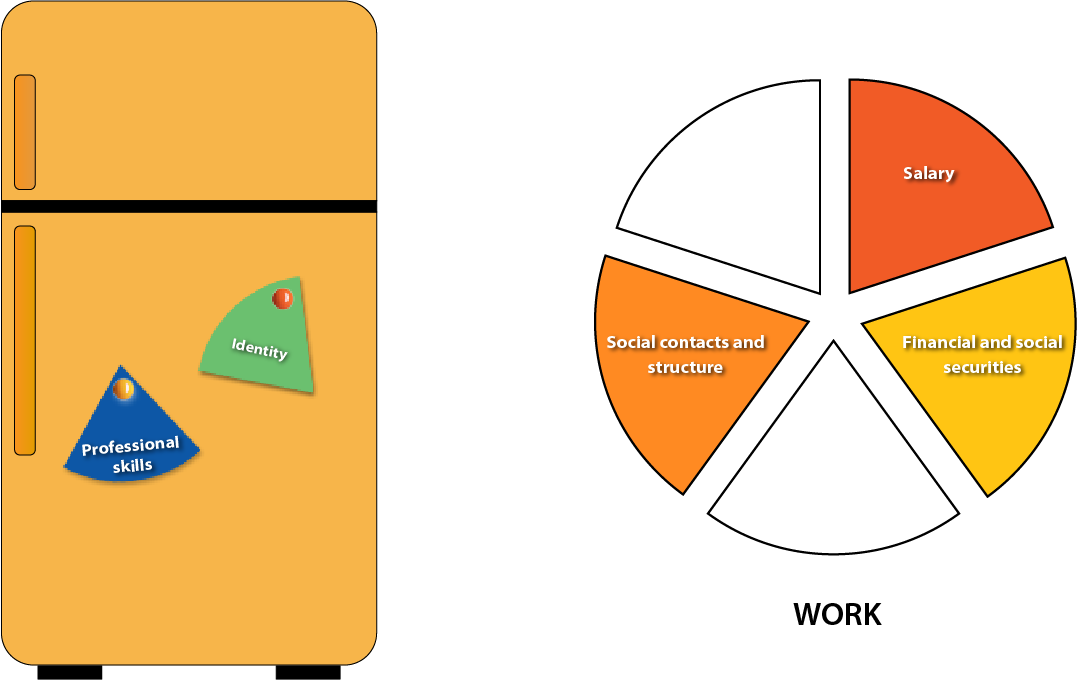
If you try to have the whole pie you might actually limit your choices. For example, if you are not willing to forgo salary for now, you might miss opportunities to develop social contacts and professional skills through satisfying voluntary work.
On the other hand, you might choose to take a lower-level job than you had before, because you prioritize having a salary, financial security and social contacts. For now, you will put identity and professional skills in the fridge.
Your choices might be different at different stages in your life. Maybe during this assignment you can put all the pie in the fridge and take the time out from working, as an opportunity to get more academic qualifications, spend more time with your children, or enjoy new activities.
There is also a sixth portion of the pie introduced by Carine Bormans, which is flow. This concept is described by psychologist Mihály Csíkszentmihályi as a state of complete immersion in an activity. This absorbs the mind and frees it from preoccupation with anxieties, and re-establishes a sense of control. For your mental well-being it is really important to ensure that you build opportunities for flow into your life. This can be through a job, volunteer work, an activity such as art or sport, meditation, or anything else that absorbs you and helps you find meaning.
The suggestions given below are intended to stimulate your thinking and to give you some ideas. We hope that they will help you and your family, though individuals and situations are different and cultural norms vary.
- Set goals: The key is to identify your priorities and then set yourself short-term and long-term goals for your time in this location. Three of each is a manageable number. Long-term goals can be broken up into smaller goals.
- Mark milestones: Start with small achievable goals, such as calling a contact or unpacking a box, and mark such milestones with a celebration in your own way. Do not minimize your achievements by using the word “just” when sharing about what you have done..
- Try something new: Focus on what your possibilities are now, rather than on what you left behind. Be open to trying new activities to replace the favorite hobbies or activities you can no longer do. There might be new possibilities locally or online that you have never heard of or thought of trying, but end up enjoying.
- Be willing to learn: Try to foster a growth mindset. This means being willing to listen and learn. Remember the power of the word “yet”. For example, say “I don’t speak the language at all yet, but I will learn.”
- Be intentional: To help put yourself in a positive frame of mind and be intentional about your goal setting, try this three-step exercise, suggested by expat career coach Chibesa Mwape. Every day write down: i) what you’re going to let go of today; ii) things you feel grateful for; and iii) one thing you’re going to focus on during that specific day.
- Revisit Toolkit 2: Review the Strategies and Tips in Toolkit 2, and think about if they are relevant to you, and how to apply them intentionally.
- Network at school: If you have children at school, connecting with other parents is a great way to start making friends. Find out if there are ways to be involved in the school, such as being a parent volunteer, if the school/country allows it.
- Learn the language: The best way is to join a language class, where you can also make friends. Learning together is very bonding.
- Join groups: Make it a priority to join groups, even if they don’t appeal to you at first. Give new friends and activities a chance, and be open to surprises. Follow up on contacts. Take the initiative and suggest meeting for coffee or lunch, even if it feels uncomfortable at first.
- Be active in WBG Family Network: Many WBG partners in duty stations find friends, fun and meaningful activities in their local WBG Family Network. Try volunteering to lead an activity, or help organize social activities or outings. As you settle in, you might want to support the WBG community by welcoming other newcomers, or even starting a group if there isn’t one.
- Explore online expat resources: Online groups can be helpful in linking up with other expats in your new location or globally. In such groups you can also share issues that concern you with others who understand. There are suggestions under More Resources.
- Develop networks: If you want to work or volunteer, you will probably need to network proactively to find opportunities. Regulations relating to WBG spouses working or volunteering are country-specific, so get accurate information. Remember that your spouse is not allowed to seek work for you in the WBG, but you may do so through networks you develop yourself.
- Reframe your thinking: If you are struggling with the loss of career, try to reframe the experience by thinking about it as a career detour rather than an end to “me being a professional”. Volunteer work can be deeply satisfying as well, and a way to add skills and professional experiences to your portfolio.
- Work online: Explore the possibility of remote working opportunities. The increase in these is one of the silver linings of the Covid-19 pandemic. Many companies are now recruiting for remote positions, and this means you can work from anywhere in the world, as long as you have good internet and your visa permits it. The structural shift in the future of work now makes bringing your former work to your new location another option to explore.
- Study: Continuing education is another strategy to help you keep up to date as a professional or learn new skills during this career detour. There is a wealth of free courses being offered on platforms like Coursera or EDX.
- Strategize: Attend WBG Family Network’s Virtual Career Lab, which is a series of workshops designed to give you tools and strategies to navigate your career as a globally mobile professional. Contact WBG Family Network for dates of the next workshop series.
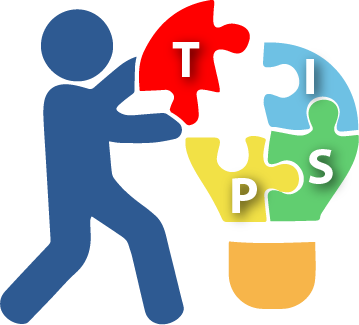
Here are some useful exercises to help you identify, with more precision, what goals and action steps you can formulate in order to thrive in this assignment.
- If this is your first assignment, do this exercise by thinking about: i) a favorite time in your life that went well; and ii) a time that was particularly challenging.
- If this is not your first assignment, identify your favorite posting and think about what made it go well. List the things that worked for you. Here are some questions to kickstart your thinking:
- What kind of mindset did you have towards that relocation?
- Did you make a shared decision to accept that posting?
- What life stage were you at?
- Were you able to work?
- How did you make friends?
- Now identify an assignment that was challenging for you? What made it challenging for you? Again, ask yourself the same questions as above.
- With this reflection as your basis, write down some goals and action steps you can take to make sure that this assignment will end up being one of your favorites.
Dr. Megha Gore, a WBG Mental Health Focal Point, suggests this diagram to help you be intentional about different aspects of caring for yourself. You can use it to define self-care goals.
